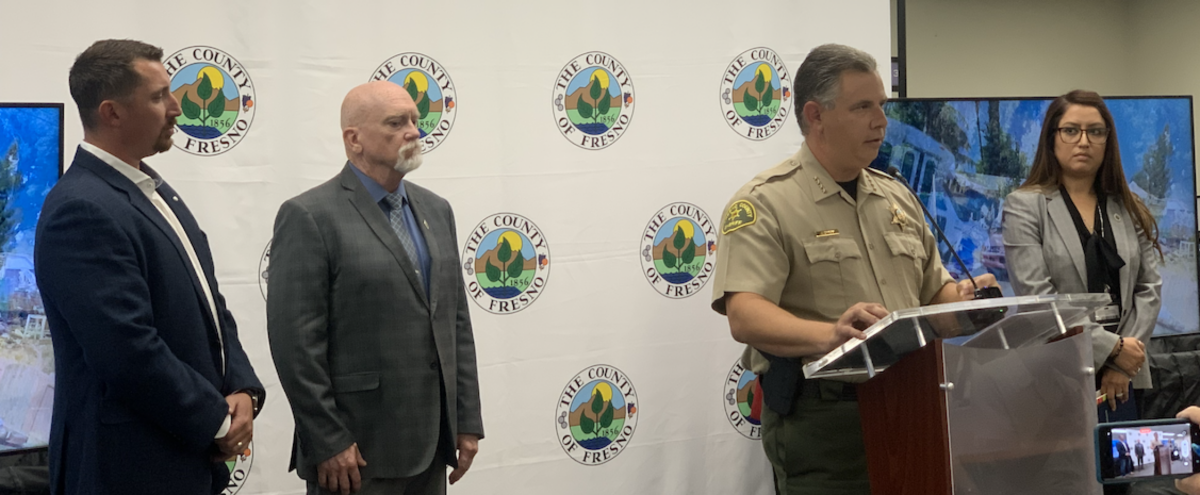
Fresno Sheriff John Zanoni speaks at a news conference in Downtown Fresno on July 25 about an ordinance to ban homeless encampments. Photo by Frank Lopez
Written by Frank Lopez
A recent ruling from the U.S. Supreme Court has set California’s governor and local elected officials toward banning sleeping outdoors.
Fresno County Supervisor Steve Brandau held a press conference Thursday to announce that he will introduce an ordinance at the Aug. 6 Board of Supervisors meeting that would prohibit homeless encampments on county land.
The ordinance follows Gov. Gavin Newsom’s executive order Thursday for state agencies to start removing homeless encampments on state land, which follows the Supreme Court’s ruling allowing cities to enforce bands on sleeping outside in public spaces.
“The County of Fresno, or the city, is not obligated to provide a bed, which is what the Ninth Circuit had ruled. We are really happy with that,” Brandau said, referring to the legal fight that led to today’s announcement.
Brandau was joined by supporters including Fresno County Sheriff John Zanoni, Fresno Area Hispanic Foundation Chief Operating Officer Yery Olivares, Nick Rocca of Rocca Ranches, and Deputy County Administrative Officer Amina Flores-Becker.
The “Unlawful Camping on Public and Private Property and Obstruction of the Public Right of Way” ordinance would prohibit unpermitted camping on public property as well as on private property in Fresno County. That includes obstructing public access to sidewalks, trails entrances to public facilities and other right of ways.
The ordinance creates penalties for violations only after attempts to divert individuals to behavioral health or housing services have failed.
Violations would be categorized as a misdemeanor punishable with a fine up to $1,000 or six months in jail.
Brandau said the ordinance is not meant to target the homeless — only certain behaviors.
Brandau said it’s also important to focus on encampments in unincorporated rural areas and county islands such as Old Fig, Mayfair, Sunnyside and Tarpey Village in Clovis.
Zanoni said the goal is not to cite people, leaving citations and arrests as a last resort because they are unhoused.
“Our goal is to keep them from being a public nuisance, so people don’t have to walk around their encampments on the sidewalk,” Zanoni said. “Our goal is to get you [homeless individuals] off the street and into a program.”
Rocca said his farm has suffered losses from activities of homeless individuals and is thankful for the executive order that will allow the county to prohibit homeless encampments.
Rocca is the incoming president of the Fresno Chamber of Commerce and says many in the business community want to be part of a solution.
“Businesses all have the same sentiment— ‘what can we do to help,’” Rocca said. They want to help. They want to solve this issue. They are compassionate for what the people are going through, but they know that doing nothing is not the answer.”
Flores-Baker said that at any given time the county has over 100 reports about encampments in unincorporated Fresno County. She is unaware of how many active encampments are out there.
Dez Martinez, executive director of We are NOT Invisible and the Fresno Homeless Union, said there are only 34 inpatient psychiatric beds in Fresno County. The organizations she works for advocate for and assist individuals and families experiencing homelessness
Apart from those, Flores-Baker said there are about 400 hundred beds under different types of transitional housing, including behavioral health beds, and permanent housing.
Martinez brought up the definition of criminalization—the action of turning someone into a criminal by making their activities illegal—and believes that’s what government is doing.
Martinez said she was homeless for about a year and a half, and has experienced sweeps of homeless encampments, recalling aggressive officers and the seizure and destruction of property.
She said these activities push individuals further into mental health crisis and drug abuse.
“If Mr. Brandau wants to know what a day in the life of a homeless individual is like, he needs to come out with us and we can show him what’s it liked to be unhoused here,” Martinez said.








